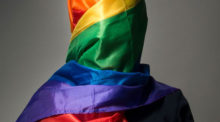Elaine Smith
“Sex is the elephant in the room when we talk about issues of integration and human rights in relation to Islam,” says Professor Aisha Ahmad, co-director of the Islam and Global Affairs Initiative at the Munk School of Global Affairs.
The “elephant” will be on display September 26 when a panel of global authorities gathers at the Munk School for a discussion called Sex and Islam: From LGBTQ Rights to Muslim Feminists. It’s an opportunity for what Ahmad calls “a sophisticated, scholarly conversation that will explore how these dynamics play out at a global level.”
“It’s a celebration of ideas that are not often given a platform. We’re taking away extremism and reflecting the majority and actual lived experiences of Muslims that are as diverse as the world itself.”
The panel, chaired by Ahmad, comprises:
- Ayesha S. Chaudhry
Canada Research Chair in Religion, Law and Social Justice; Associate Professor of Islamic Studies and Gender Studies, University of British Columbia
- Shereen El-Feki
Professor of Global Practice, Munk School of Global Affairs, University of Toronto
- Mohammad Fadel
Associate Professor at the Faculty of Law and Canada Research Chair for the Law and Economics of Islamic Law, University of Toronto
- El-Farouk Khaki
Imam, El Tawhid Juma Circle
The discussion will shed light on sex and Islamic values and will consider whether Muslim beliefs about gender, sexuality and family are compatible with widely accepted liberal democratic ideals.
It’s a discussion that is timely, said panellist El-Feki, given the waves of Arab migration to the West and tendency for “othering.”
“Othering is an approach that has been used throughout history,” said El-Feki, a former journalist for The Economist and Al-Jazeera, and author of a book about the intersection of sex, politics and Islam in the Middle East, Sex and the Citadel: Intimate Life in a Changing Arab World.
“It usually focuses on sexuality. It portrays the men as rapacious this time around, because of the perceived sexual repression with which they live and portrays them as posing a danger to local women. There is still a lot of ignorance around sexuality, Islam, women and the role of men.”
In addition, noted Ahmad, recent headlines such as those about LGBTQ persecution in Chechnya “are deeply offensive to moral sensibilities, while women’s bodies are often used and targeted in Islamophobia.”
El-Feki believes that in the Middle East, sex is used by political and religious leaders as a means of controlling the population.
“You take sex, wrap it up in religion and use it as a tool for social control,” she said. “Sex is integral to any discussion of international relations; if you don’t achieve the principles of freedom and equality in the bedroom, how on Earth can you do so beyond? The personal remains political.”
Hear more about these important issues during the panel discussion, September 26 from 5:30 to 7:30 p.m. The event is open to the public and free to attend; registration is required.
“We’ll have four global authorities in one room, and I am tremendously excited about having this conversation with them,” says Ahmad.
September 20, 2017
